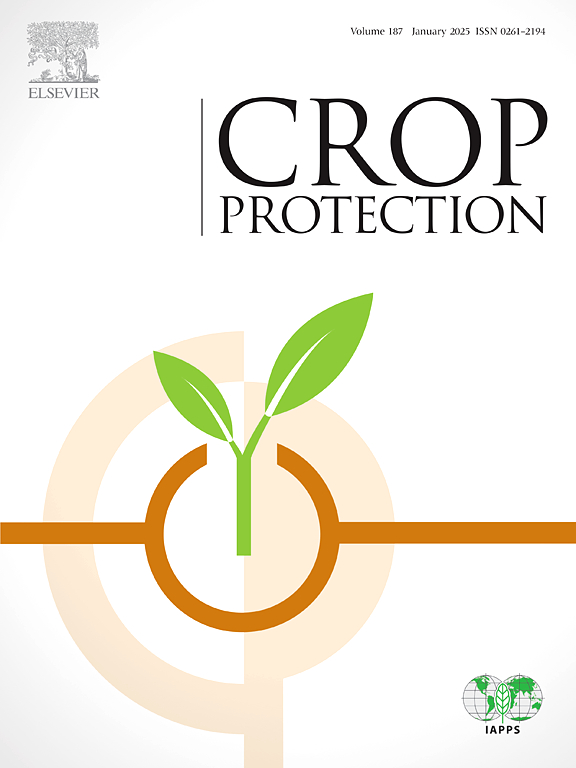Performance of novel alternatives to neonicotinoid insecticide seed treatments for managing maggots (Diptera: Anthomyiidae) in large-seeded vegetable crops
IF 2.5
2区 农林科学
Q1 AGRONOMY
引用次数: 0
Abstract
Maggots [Delia spp. (Diptera: Anthomyiidae)] are pests of large-seeded vegetable crops such as snap bean, dry bean, and sweet corn. Economically damaging infestations of Delia spp. can be sporadic and difficult to predict, but typically occur early in the spring when soil conditions are cool and wet. Larval feeding can substantially reduce plant stands and compromise normal plant vigor and development. Neonicotinoid insecticide seed treatments are currently used to protect large-seeded vegetable crops from Delia spp, but concerns regarding their negative impacts on beneficial insects and the environment have stimulated interest in identifying effective non-neonicotinoid seed treatments. From 2021 to 2024, field studies in the northeastern, midwestern, and pacific northwestern USA evaluated non-neonicotinoid insecticide seed treatments belonging to the spinosyn, anthranilic diamide, and isoxazoline classes for managing Delia spp. in snap bean, dry bean, and sweet corn. Results indicated that cyantraniliprole and spinosad provided a similar level of Delia spp. control as thiamethoxam, the neonicotinoid standard, in snap bean. None of the alternatives were as effective as thiamethoxam for Delia spp. control in dry bean. In contrast, all non-neonicotinoid insecticides such as chlorantraniliprole, cyantraniliprole, isocycloseram, spinosad, and tetraniliprole were effective in protecting sweet corn from Delia spp. Most of these non-neonicotinoid options are not currently approved for commercial use on these crops, but our results could help support future registrations. Adoption of non-neonicotinoid seed treatments for Delia spp. control also must consider their efficacy against other common early-season insect pests, risk to pollinators and other non-target organisms, and cost.
新烟碱类杀虫剂新替代品在大种子蔬菜作物中管理蛆(双翅目:花蝇科)的效果
蛆(双翅目:花蝇科)是豆角、干豆、甜玉米等大种子蔬菜作物的害虫。对经济造成破坏的迪丽亚属植物的侵扰可能是零星的,难以预测,但通常发生在土壤条件凉爽潮湿的早春。幼虫取食会大大减少植物立地,损害植物的正常活力和发育。新烟碱类杀虫剂的种子处理目前用于保护大种子蔬菜作物免受Delia spp的侵害,但对其对有益昆虫和环境的负面影响的担忧激发了人们对寻找有效的非新烟碱类杀虫剂种子处理的兴趣。从2021年到2024年,在美国东北部、中西部和西北太平洋地区进行了实地研究,评估了非新烟碱类杀虫剂的种子处理方法,包括spinosyn类、邻氨基苯胺类和异恶唑啉类,用于管理豆荚、干豆和甜玉米中的Delia虫。结果表明,氰胺虫胺和spinosad与新烟碱标准剂噻虫嗪的防治效果相当。没有一种药剂的防治效果比得上噻虫嗪。相比之下,所有非新烟碱类杀虫剂,如氯虫虫、氰虫虫、异环醚胺、spinosad和四虫虫,都能有效地保护甜玉米免受迪利亚虫的侵害。目前,这些非新烟碱类杀虫剂中的大多数尚未被批准用于这些作物的商业用途,但我们的研究结果可能有助于未来的注册。采用非新烟碱类的种子处理来控制迪利亚蝇还必须考虑其对其他常见的早季害虫的有效性、对传粉媒介和其他非目标生物的风险以及成本。
本文章由计算机程序翻译,如有差异,请以英文原文为准。
求助全文
约1分钟内获得全文
求助全文
来源期刊

Crop Protection
农林科学-农艺学
CiteScore
6.10
自引率
3.60%
发文量
200
审稿时长
29 days
期刊介绍:
The Editors of Crop Protection especially welcome papers describing an interdisciplinary approach showing how different control strategies can be integrated into practical pest management programs, covering high and low input agricultural systems worldwide. Crop Protection particularly emphasizes the practical aspects of control in the field and for protected crops, and includes work which may lead in the near future to more effective control. The journal does not duplicate the many existing excellent biological science journals, which deal mainly with the more fundamental aspects of plant pathology, applied zoology and weed science. Crop Protection covers all practical aspects of pest, disease and weed control, including the following topics:
-Abiotic damage-
Agronomic control methods-
Assessment of pest and disease damage-
Molecular methods for the detection and assessment of pests and diseases-
Biological control-
Biorational pesticides-
Control of animal pests of world crops-
Control of diseases of crop plants caused by microorganisms-
Control of weeds and integrated management-
Economic considerations-
Effects of plant growth regulators-
Environmental benefits of reduced pesticide use-
Environmental effects of pesticides-
Epidemiology of pests and diseases in relation to control-
GM Crops, and genetic engineering applications-
Importance and control of postharvest crop losses-
Integrated control-
Interrelationships and compatibility among different control strategies-
Invasive species as they relate to implications for crop protection-
Pesticide application methods-
Pest management-
Phytobiomes for pest and disease control-
Resistance management-
Sampling and monitoring schemes for diseases, nematodes, pests and weeds.
 求助内容:
求助内容: 应助结果提醒方式:
应助结果提醒方式:


